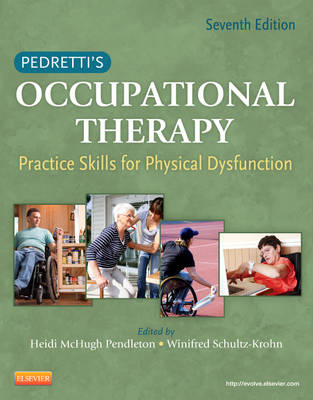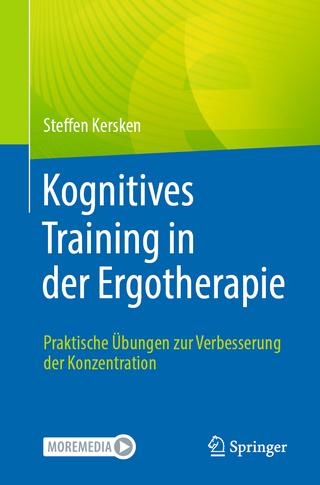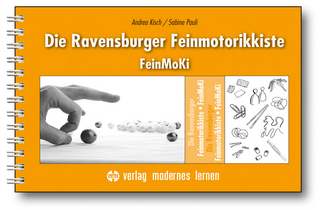
Pedretti's Occupational Therapy
Mosby (Verlag)
978-0-323-05912-1 (ISBN)
- Titel erscheint in neuer Auflage
- Artikel merken
Using a comprehensive, case-based learning approach, Pedretti's Occupational Therapy: Practice Skills for Physical Dysfunction, 7th Edition provides a thorough introduction to occupational therapy practice and prepares you to work with adults who have physical disabilities. 48 chapters cover everything from OT history, theory, process, and practice to evaluation, intervention, performance skills, and client factors. Significant updates have been made to this edition, including a new full-color design and new content on polytrauma and advances in prosthetics and assistive technologies. This leading text also offers a wide range of helpful features, such as threaded case studies, OT practice notes, and ethical considerations that help you apply content to a clinical setting.
UNIQUE! Threaded case studies help you apply key concepts to real-life situations.
UNIQUE! OT Practice Notes convey important considerations for professional practice.
UNIQUE! Ethical Considerations highlight information you need to know to practice ethically.
Client-centered perspective uses the terminology set forth by the updated 2008 OT Practice Framework to help you include the client when making treatment decisions.
Evidence-based content includes clinical trials and outcome studies where appropriate.
Cultural diversity/sensitivity familiarizes you with diverse client populations and situations you may encounter in professional practice.
UNIQUE! Information on prevention moves your OT comprehension beyond just intervention and treatment.
Student Resources on Evolve feature video clips, review questions, crossword puzzles, learning activities, forms for practice, and more to aid your understanding of key concepts.
Key terms, chapter outlines, and chapter objectives lay out the information you can expect to learn from a chapter.
Chapter on polytrauma, post-traumatic stress disorder, and injuries related to the War on Terror teaches you how to provide OT services to this unique population.
Content covers new advances in prosthetics and assistive technologies, and provides more up-to-date assessment and interventions for TBI problems related to cognitive and visual perception.
Full-color design visually clarifies important concepts.
Video clips on the companion Evolve website vividly demonstrate a variety of OT interventions.
Part I: Overview: Occupational Therapy Foundations for Physical Dysfunction
1. The Occupational Therapy Practice Framework and the Practice of Occupational Therapy for Persons with Physical Disabilities
2. History and Practice Trends in the Treatment of Physical Dysfunction
Part II: Occupational Therapy Process and Practice
3. Application of the Occupational Therapy Practice Framework to Physical Dysfunction
4. Systematic OT Practice: A Model of Evidence-Based Practice for OT
5. Health Promotion and Wellness for People with Physical Disabilities
6. Personal and Social Contexts of Disability: Implications for Occupational Therapists
7. Teaching Activities in Occupational Therapy
8. Documentation of Occupational Therapy Services
9. Infection Control and Safety Issues in the Clinic
Part III: Occupational Performance and the Performance Areas: Evaluation and Intervention
10. Activities of Daily Living
11. Mobility
Section I: Functional Ambulation
Section II: Wheelchairs
Section III: Community Mobility
12. Sexuality and Physical Dysfunction
13. Sleep and Rest
14. Work Evaluation and Work Programs
15. Americans with Disabilities Act and Related Laws that Promote Participation in Work, Leisure, and Activities of Daily Living
16. Leisure Occupations
17. Assistive Technology
Part IV: Performance Skills and Client Factors: Evaluation and Intervention
18. Performance Skills: Definitions and Evaluation in the Context of the Occupational Therapy Practice Framework
19. Evaluation of Motor Control
20. Occupation-Based Functional Motion Assessment
21. Evaluation of Joint Range of Motion
21. . Evaluation of Muscle Strength
23. Evaluation of Sensation and Intervention for Sensory Dysfunction
24. Evaluation and Treatment of Visual Deficits Following Brain Injury
25. Evaluation and Intervention of Perceptual Dysfunction
26. Evaluation and Intervention of Cognitive Dysfunction
27. Eating and Swallowing
28. Evaluation and Pain Management
Part V: The Occupational Therapy Process: Implementation of Intervention
29. Therapeutic Occupations and Modalities
30. Orthotics
Section I: Hand Splinting: Principles, Practice, and Decision Making
Section II: Suspension Arm Devices and Mobile Arm Supports
31. Traditional Sensorimotor Approaches to Intervention
Section I: The Rood Approach: A Reconstruction
Section II: Proprioceptive Neuromuscular Facilitation Approach
32. Motor Learning
Part VI: Intervention Applications
33. Cerebral Vascular Accident/Stroke
34. Traumatic Brain Injury
35. Degenerative Diseases of the Central Nervous System
Section 1: Amyotrophic Lateral Sclerosis
Section 2: Alzheimer's Disease
Section 3: Huntington's Disease
Section 4: Multiple Sclerosis
Section 5: Parkinson's Disease
36. Spinal Cord Injury
37. Neurogenic and Myopathic Dysfunction
38. Arthritis
39. Hand and Upper Extremity Injuries
40. Hip Fractures and Lower Extremity Joint Replacement
41. Low Back Pain
42. Burns and Burn Rehabilitation
43. Amputations and Prosthetics
Section 1: General Considerations of Upper and Lower Extremity Amputations
Section 2: Upper Extremity Amputations
Section 3: Lower Extremity Amputations
44. Cardiac and Pulmonary Diseases
45. Oncology
46. Special Needs of the Older Adult
47. HIV Infection and AIDS
48. Polytrauma and the War on Terror NEW!
Glossary
| Erscheint lt. Verlag | 24.1.2012 |
|---|---|
| Verlagsort | St Louis |
| Sprache | englisch |
| Maße | 222 x 281 mm |
| Themenwelt | Medizin / Pharmazie ► Physiotherapie / Ergotherapie ► Ergotherapie |
| ISBN-10 | 0-323-05912-0 / 0323059120 |
| ISBN-13 | 978-0-323-05912-1 / 9780323059121 |
| Zustand | Neuware |
| Informationen gemäß Produktsicherheitsverordnung (GPSR) | |
| Haben Sie eine Frage zum Produkt? |
aus dem Bereich



